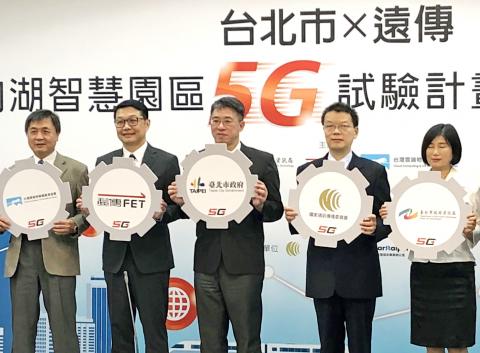Far EasTone Telecommunications Co Ltd (遠傳電信) yesterday said it plans to set up an indoor 5G trial field next month at Neihu Technology Park (內湖科技園區) for 100 enterprises or research organizations to run three-month free trials, a day after the telecom won the first approval to install a 5G-based Proof of Business network.
The telecom said it plans to offer the trials in collaboration with Ericsson Taiwan (台灣愛立信) at the Neihu Sports Center on a commercial 5G network using the 3.5 gigahertz band.
As part of the trials, the telecom is to supply free 5G SIM cards, routers and an application enablement platform, allowing firms to utilize it to test Internet of Things (IoT) business opportunities from this month to December.

Photo: CNA
The average download speed of the 5G network is at least 10 times faster than a 4G LTE network, the company said.
“We hope the trials help upstream and downstream companies transit to 5G technology more smoothly,” Far EasTone vice president Philip Tseng (曾詩淵) told reporters on the sidelines of a news conference in Taipei.
The telecom is teaming up with Taipei’s Smart City Project Management Office, Department of Information Technology and Department of Economic Development, as well as the Taiwan IOT Technology and Industry Association (台灣物聯網產業技術協會) to launch the 5G trials.
Notebook computer maker Compal Electronics Inc (仁寶電腦) and smartphone maker HTC Corp (宏達電) are to provide the testing ground, the telecom said.
The announcement came after the National Communications Commission on Thursday approved Far EasTone’s plan to deploy a 5G proof-of-business network.
The commission has approved six 5G proof-of-concept trials and is still reviewing other applications, it said, adding that it welcomes more applications to explore business opportunities or business models on 5G networks.
Telecoms that win 5G spectrum licenses are expected to launch commercial 5G services in July next year at the earliest, the commission said.

TAKING STOCK: A Taiwanese cookware firm in Vietnam urged customers to assess inventory or place orders early so shipments can reach the US while tariffs are paused Taiwanese businesses in Vietnam are exploring alternatives after the White House imposed a 46 percent import duty on Vietnamese goods, following US President Donald Trump’s announcement of “reciprocal” tariffs on the US’ trading partners. Lo Shih-liang (羅世良), chairman of Brico Industry Co (裕茂工業), a Taiwanese company that manufactures cast iron cookware and stove components in Vietnam, said that more than 40 percent of his business was tied to the US market, describing the constant US policy shifts as an emotional roller coaster. “I work during the day and stay up all night watching the news. I’ve been following US news until 3am

UNCERTAINTY: Innolux activated a stringent supply chain management mechanism, as it did during the COVID-19 pandemic, to ensure optimal inventory levels for customers Flat-panel display makers AUO Corp (友達) and Innolux Corp (群創) yesterday said that about 12 to 20 percent of their display business is at risk of potential US tariffs and that they would relocate production or shipment destinations to mitigate the levies’ effects. US tariffs would have a direct impact of US$200 million on AUO’s revenue, company chairman Paul Peng (彭雙浪) told reporters on the sidelines of the Touch Taiwan trade show in Taipei yesterday. That would make up about 12 percent of the company’s overall revenue. To cope with the tariff uncertainty, AUO plans to allocate its production to manufacturing facilities in

Six years ago, LVMH’s billionaire CEO Bernard Arnault and US President Donald Trump cut the blue ribbon on a factory in rural Texas that would make designer handbags for Louis Vuitton, one of the world’s best-known luxury brands. However, since the high-profile opening, the factory has faced a host of problems limiting production, 11 former Louis Vuitton employees said. The site has consistently ranked among the worst-performing for Louis Vuitton globally, “significantly” underperforming other facilities, said three former Louis Vuitton workers and a senior industry source, who cited internal rankings shared with staff. The plant’s problems — which have not

COLLABORATION: Given Taiwan’s key position in global supply chains, the US firm is discussing strategies with local partners and clients to deal with global uncertainties Advanced Micro Devices Inc (AMD) yesterday said it is meeting with local ecosystem partners, including Taiwan Semiconductor Manufacturing Co (TSMC, 台積電), to discuss strategies, including long-term manufacturing, to navigate uncertainties such as US tariffs, as Taiwan occupies an important position in global supply chains. AMD chief executive officer Lisa Su (蘇姿丰) told reporters that Taiwan is an important part of the chip designer’s ecosystem and she is discussing with partners and customers in Taiwan to forge strong collaborations on different areas during this critical period. AMD has just become the first artificial-intelligence (AI) server chip customer of TSMC to utilize its advanced